Sea Surges Drive Ondo Community From Homes, Oil Spills Ruin Businesses
Despite having abundant crude oil resources, residents of this Nigerian community along the Atlantic coast have fundamental complaints about healthcare, education facilities, power supply, livelihoods, and housing.
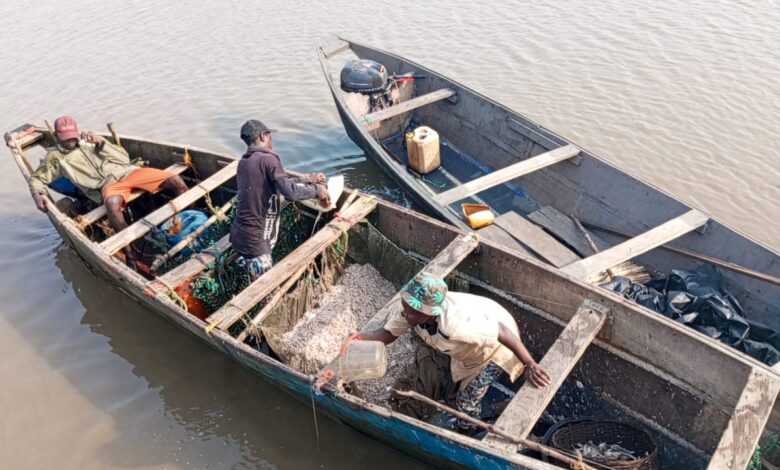
After losing his first house to a sea surge in 2015, Oluwole Omope built another from his little earnings as a sailor.
But, three years later, another sea incursion swept away that house.
He picked himself back up and built a third house, but his family was soon displaced again by the sea.
Homeless and struggling, money from his wife’s fishing business would have really helped at this time, but her livelihood continues to suffer setbacks as a result of oil spillage. As the spillage spreads, it affects aquatic life.
Oluwole is one of the frustrated residents of Ayetoro, an oil-producing community in the Ilaje area of Ondo, Southwest Nigeria.
“We are angry because this is an oil-producing community, yet we suffer,” he said. “We’ve had cases of people dying, including my sister. Today, I feel pain because she left a lot of children that are supposed to be taken care of.”
Like Oluwole’s wife, many residents of Ayetoro earn a living from fishing. But as fishes continue to die in the river, they are forced to relocate to Lagos and other lagoon areas to carry out their business.
The situation is not different in Ubale-Nla, Ilowo, Idi-Ogba, Erunna, Ipaare and Molutehin, and other communities in Ilaje along the Atlantic coast.
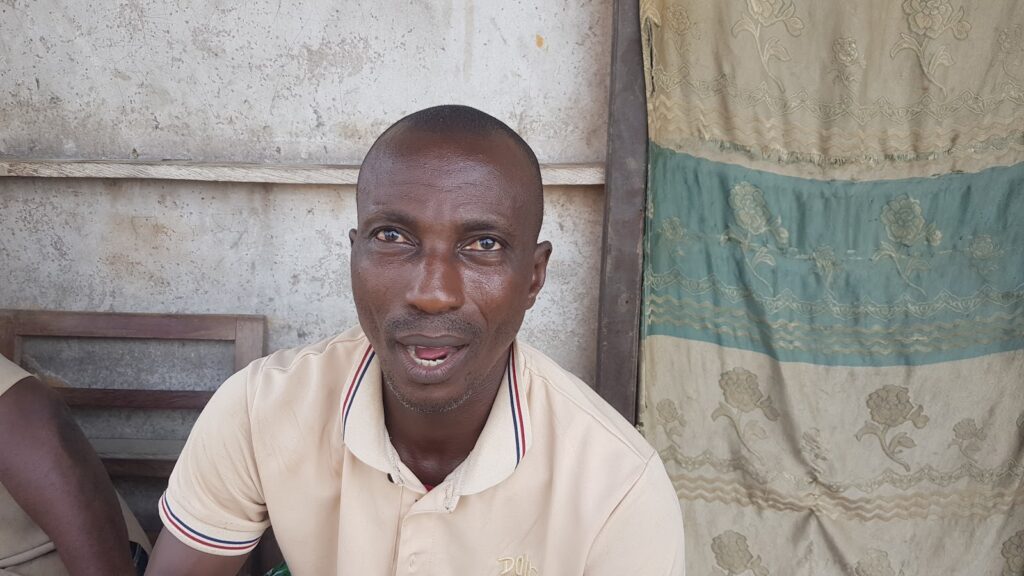
Like Oluwole, Ilehanmi Dadeowo had just roasted her crayfish and was on her way to church when we met her. And like Oluwole, the sea surge and oil spillage have forced her family out of their houses three times.
The sea surge in the coastal areas bordering the Atlantic Ocean is a natural disaster that occurs as a result of the rise in water levels and intense storms. When it occurs, it leads to widespread flooding that destroys homes and properties.
The oil spillage in the ocean, on the other hand, is caused by bursts of pipelines, oil theft, and malfunctioning production equipment used by oil producers. Aside from poisoning aquatic life, it could lead to a variety of diseases.
“I survived with my husband and children but lost a lot of properties,” Dadeowo said.
“The government did not do anything except for the fact that they usually make promises that have never been fulfilled. I lost properties worth millions of naira. It’s been two years since I became homeless.”
She currently lives with a friend. Her husband travelled to Lagos in search of a job while her children live with relatives in Ondo town.
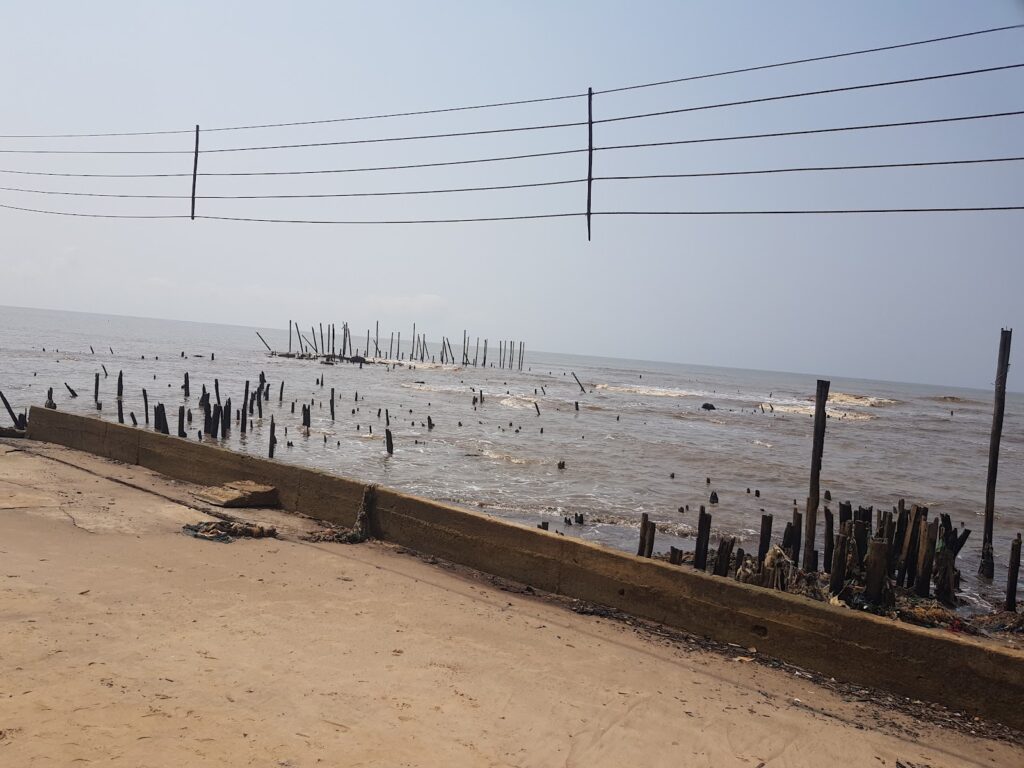
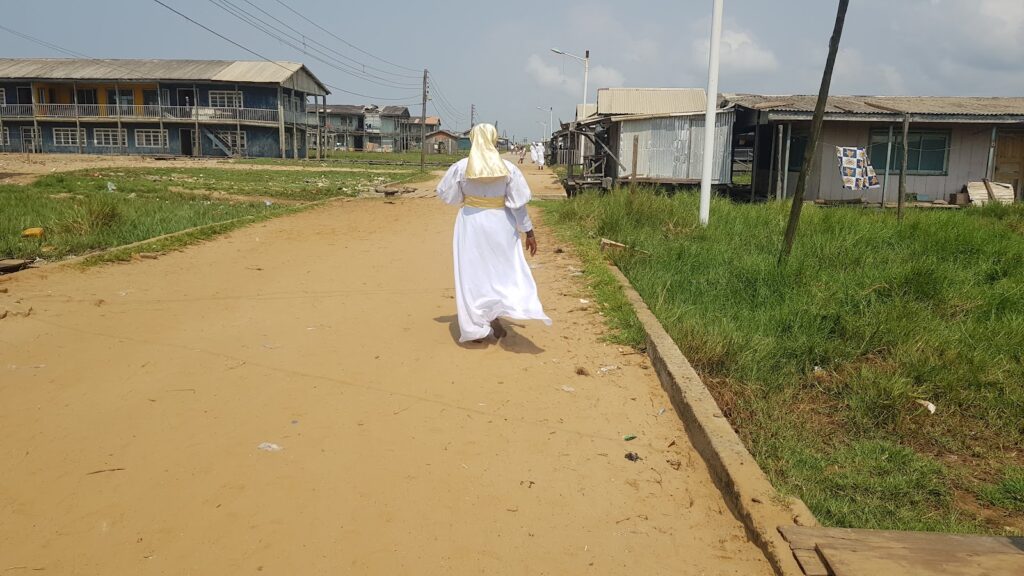
Forgotten community
Ayetoro, which translates to a peaceful city in Yoruba, was founded in 1947 by a group of unorthodox Christian settlers of the Nigerian Holy Apostles’ Community. It started as a theocratic and communist community where various industries thrived, including bakery, carpentry, fishing, shoemaking, and textile work.
Today, Ayetoro faces neglect from the authorities though it is the only oil-producing area in Ondo. Its wooden buildings are regularly flooded.
The only means of getting to Ayetoro is by water. Many travellers do not bother wearing life jackets because they grew up learning how to swim.
Even though there have been reports of boat accidents here in the past, a boat driver, nicknamed Yellow because of his fair skin, bragged about his years of experience and ability to rescue passengers in case of any misfortune.
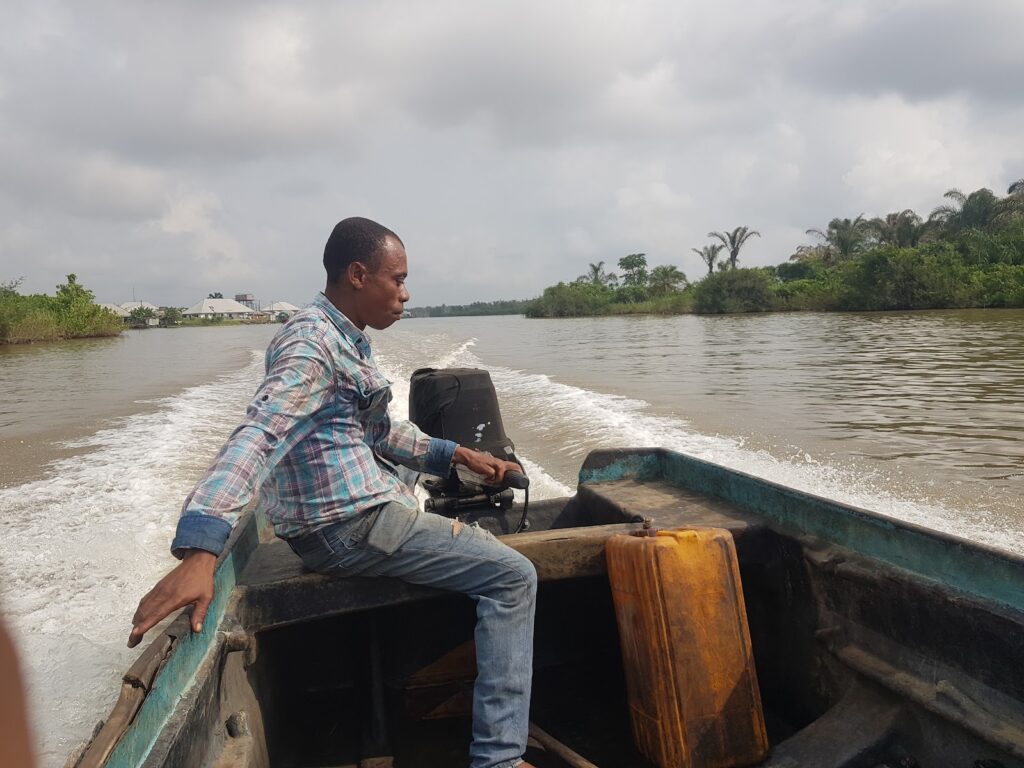
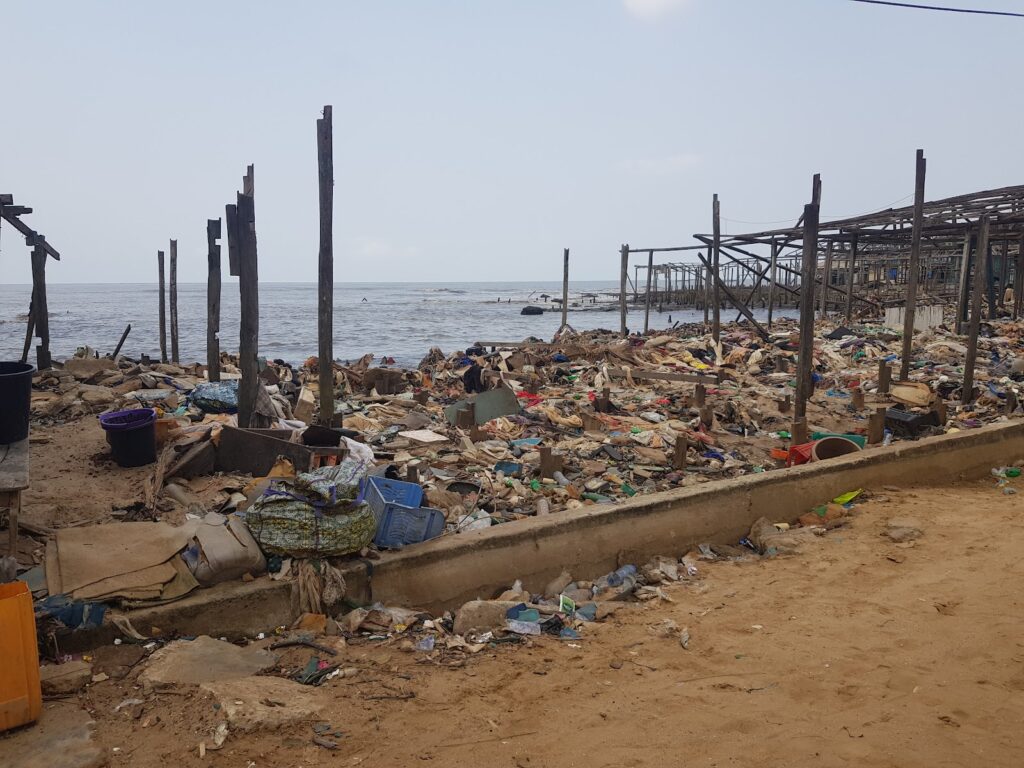
For many residents, their houses’ foundations are single straight woods embedded in the river and flat planks as the ground floors of the buildings that are merely a few feets above the lagoon.
Water everywhere, but none to drink
Despite being surrounded by water, access to drinking water is a challenge for people in Ayetoro. The oil slick on the river body makes it difficult for residents to bathe or wash their clothes in it.
The World Bank estimates that as of 2021, “approximately 70 million Nigerians had no access to basic drinking water services and 114 million were without basic sanitation facilities”. The number of people with access to piped water has reduced drastically since 1990. Many communities hosting oil exploration projects in Nigeria have been found to also have poor drinking water.
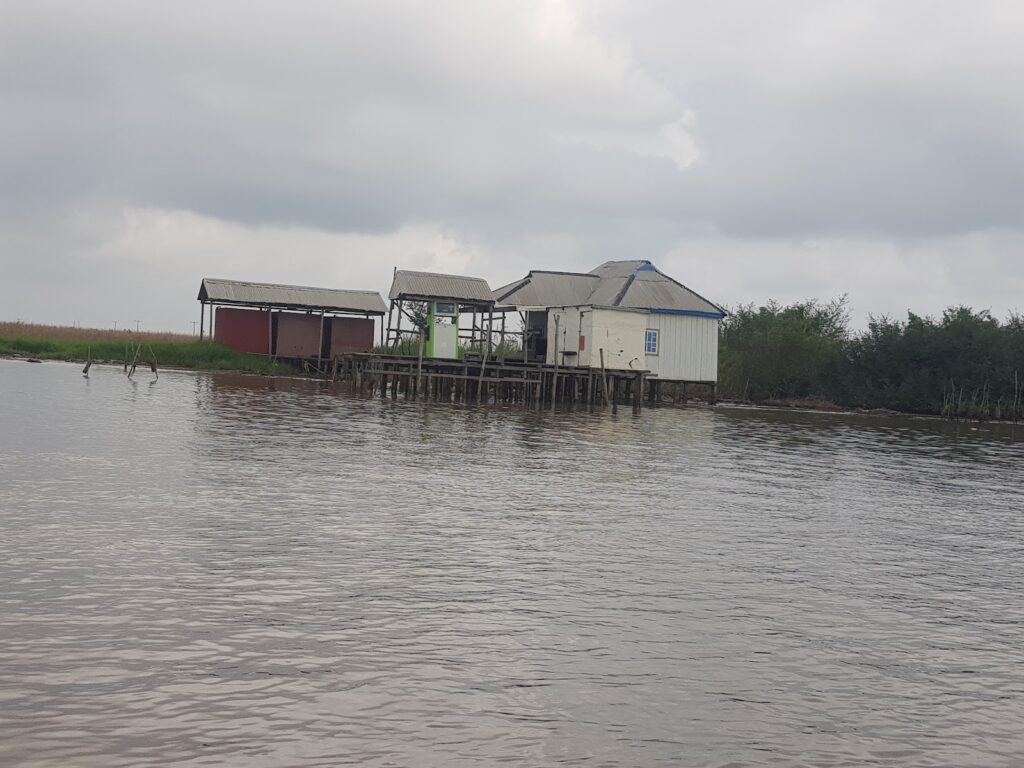
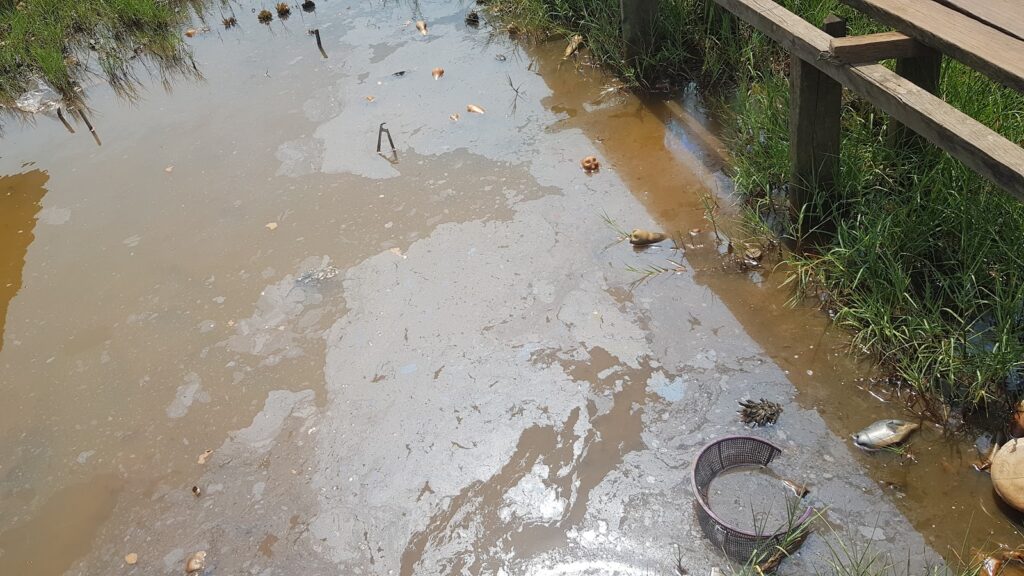
Residents allege that exploration activities by Shell Nigeria, Chevron, and Mobil Oil are making the area inhabitable. They also claim that the oil companies have for years failed to fulfil their promises of compensating the affected communities.
HumAngle reached out to the oil companies for comments, but they are yet to respond to enquiries about these claims.
“We vote during every election, but we do not get the dividend of democracy. There’s nothing working here and we need the authorities’ intervention because the oil dwellers are doing nothing to compensate us. We only rely on rainwater for survival during the rainy season and in the absence of that, we buy water from Igbokoda,” explained Lawrence Sunday.
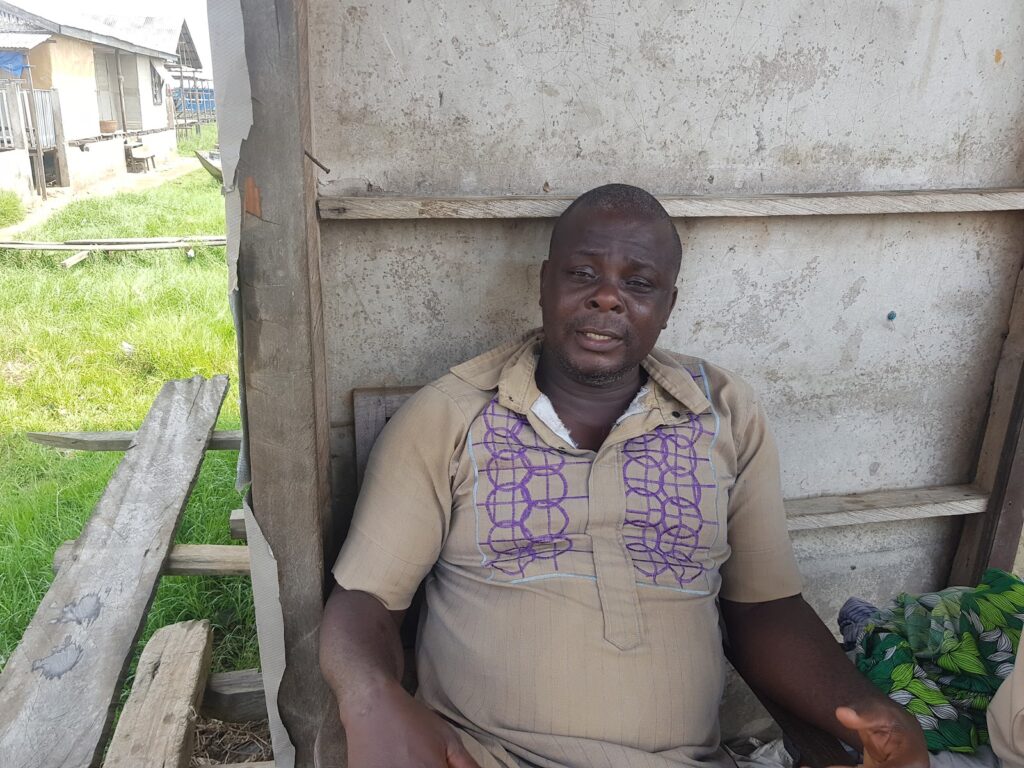
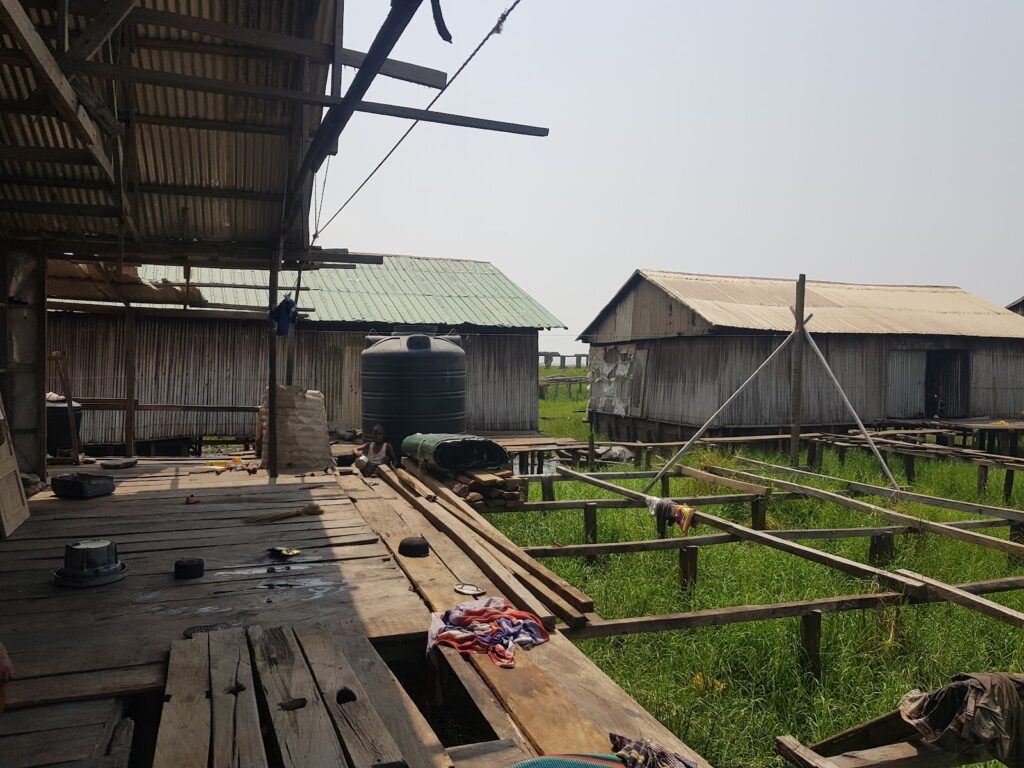
Lack of quality healthcare facility
Those who risk drinking from the impure water risk contracting upper respiratory tract infections, said Omoniyi Oluwaseun, a nurse at the only primary healthcare centre in Ayetoro.
“The consequence of the oil spill on our patients is bad and we do not have the necessary staff and facilities to properly care for them,” she added. The clinic, overtaken by water, lacks the basic equipment needed for patients. To attend to the sick, health officials often need rain boots.
HumAngle observed that the worn-out beds were infested with bed bugs, there was no water supply, there were no decent toilets, and the facility was understaffed. There is also no lying-in ward where patients who deliver newly born babies are admitted to rest for necessary medical attention.
The situation reflects the general rot in Nigeria’s primary healthcare system. Residents say lives have been lost due to the absence of a functional ambulance, including pregnant women during child labour and emergencies.
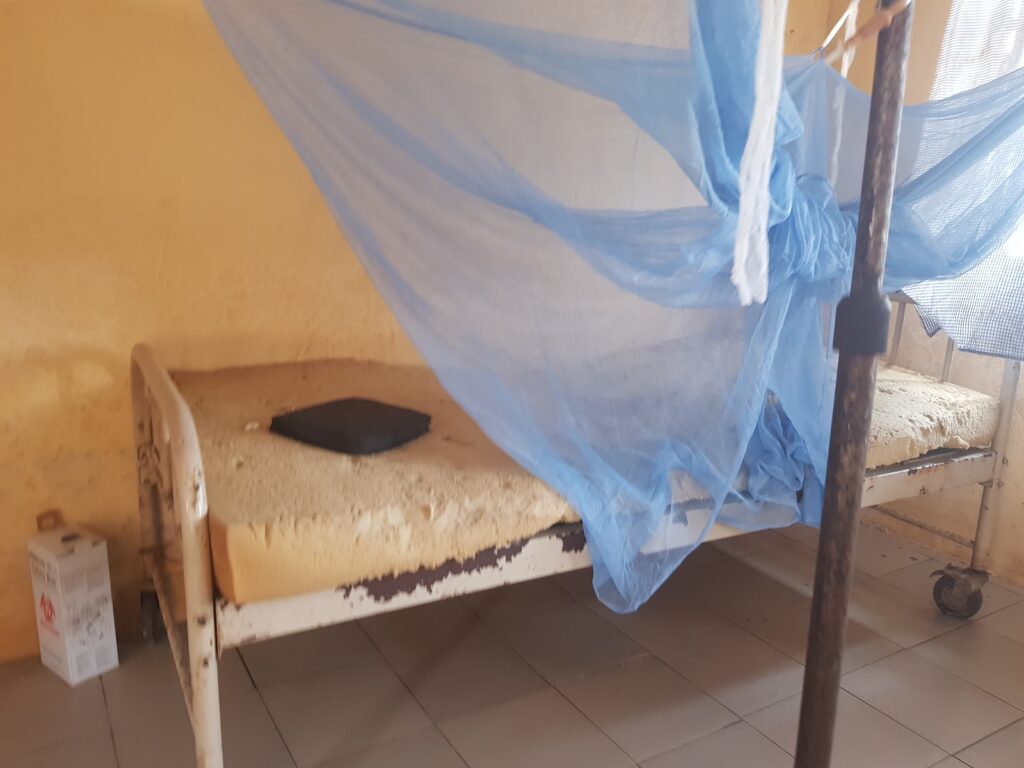
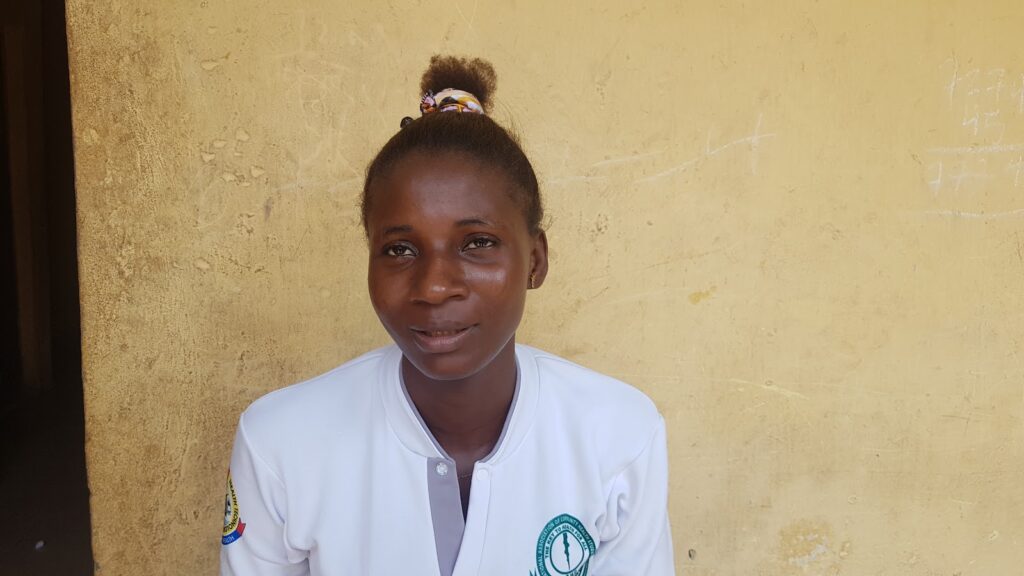
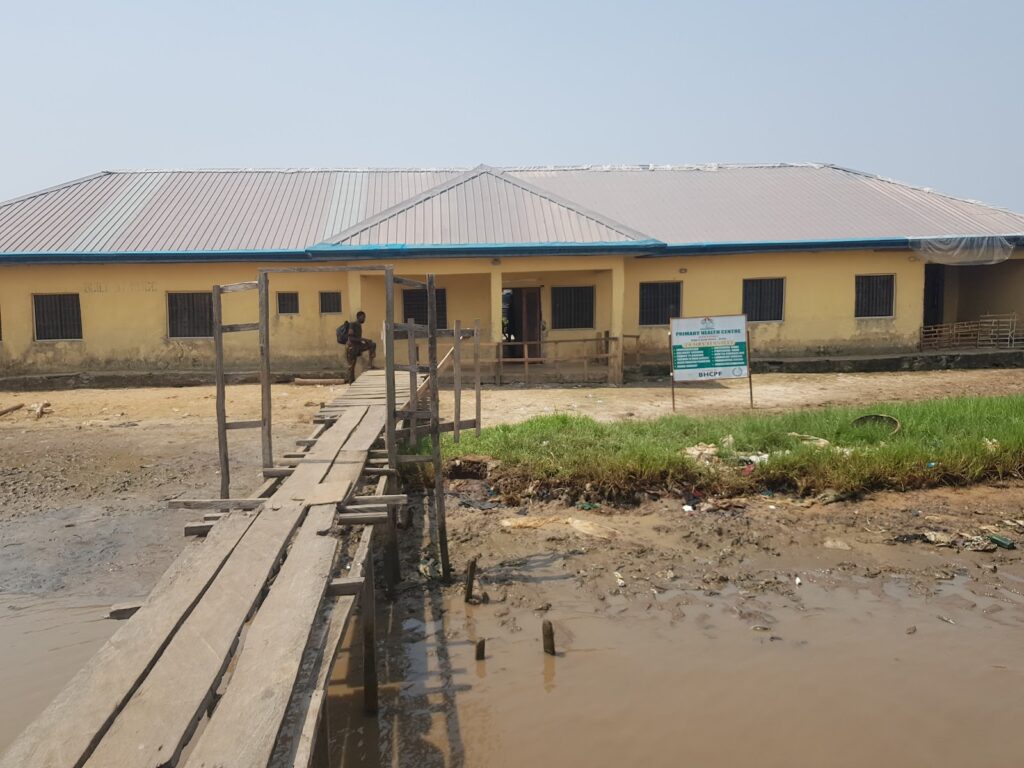
Lemomu Lawrence, a community leader, said he was yet to get over the death of his relative, Taiye Eretan, who passed on during labour due to a lack of basic equipment and emergency services in 2001. The deceased was bled heavily. She was required to be transferred to a better healthcare centre in Ondo but died in the boat.
“A decade after her death, nothing has changed. More people have died and the suffering continues,” he lamented.
About 10 percent of deaths involving pregnant women currently take place in Nigeria, with the country having the world’s fourth-highest maternal mortality.
“Lack of access to quality health care, lack of skilled health workers, education and poverty are some of the structural factors that have contributed to maternity and infant mortality rates in Nigeria, especially in rural areas, leaving women and children at higher risk of exposure to dangerous delivery practices that contribute to high mortality,” observed a 2013 report by the Nigerian National Demographic and Health Survey (NDHS).
Not connected to national grid
Locals say Ayetoro has never been connected to the national power grid. For a first-timer, the sights of electrical poles may suggest a steady supply of power, but this is not the case.
The poles were installed through communal efforts and they distributed electricity from a generator. But since the generator broke down some years back, the community has been cast in darkness. The primary healthcare facility relies on solar panels to make work possible.
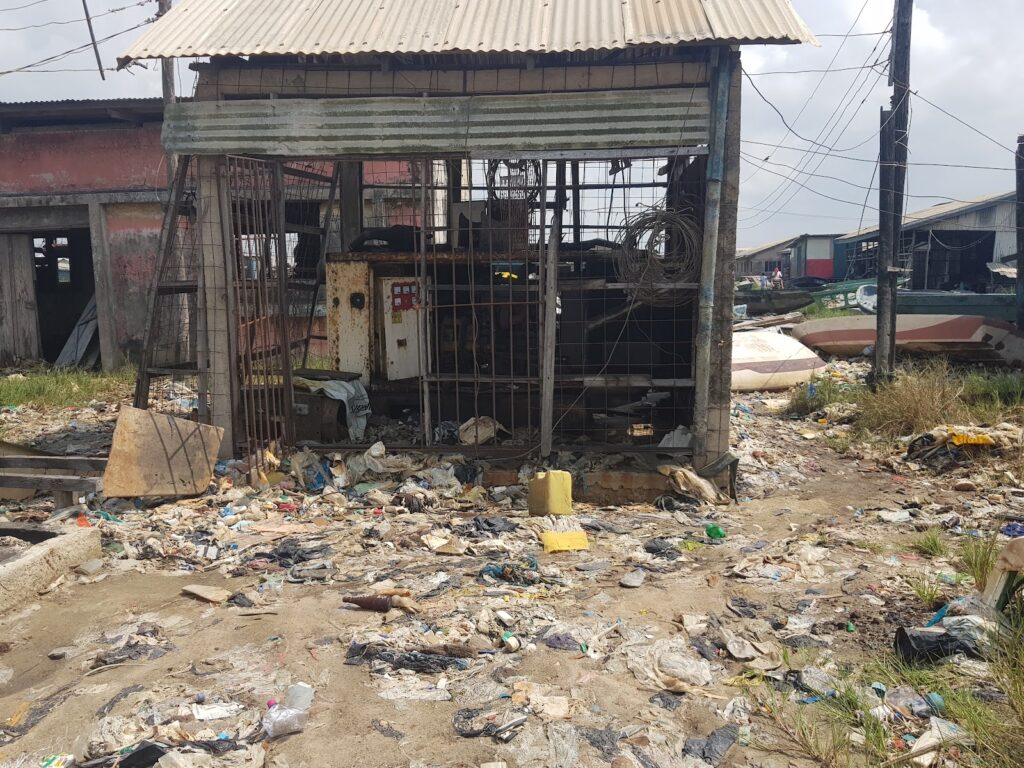
As Nigeria struggles to generate and distribute enough electricity, the vast majority of people in rural areas remain disconnected from the grid.
Former President Olusegun Obasanjo in 2006 said Nigeria would generate 10,000 megawatts (MW) of electricity by 2007 and 35,000MW by 2020. Considered not feasible, the projection was adjusted in 2009 by the late former president, Umaru Yar’Adua, who projected that installed capacity growth should be 20,000MW by 2015.
After his emergence as president, Goodluck Jonathan launched a privatisation exercise in 2013 to increase power generation and provide a stable supply of electricity to Nigerians at affordable cost. The federal government split the Power Holding Company of Nigeria (PHCN) into six generation companies and 11 private distribution companies (DisCos) while retaining ownership of the transmission company.
Years later, most parts of Nigeria are yet to get regular power supply and many other communities, like Ayotoro, have none at all, causing negative economic consequences.
Irewole Solomon, a hairstylist, told HumAngle that he has relied on a generator to carry out his business activities since he started operating in Ayetoro in 2010. He says he has no choice but to spend 70 per cent of his income on fuel.
Most tailors likewise use ‘stove irons’, heated by burning cinders, and owners of provision stores are forced to travel long distances to get ice. “We live in darkness except when we power the generator. We have never been connected to the national grid,” said Aralu Emmanuel, one of the community’s youth leaders.
Education at risk
Schoolchildren are not left out of the underdevelopment suffered by the community. The only primary school in Ayetoro has been taken over by sea on several occasions and children no longer have access roads to their classrooms.
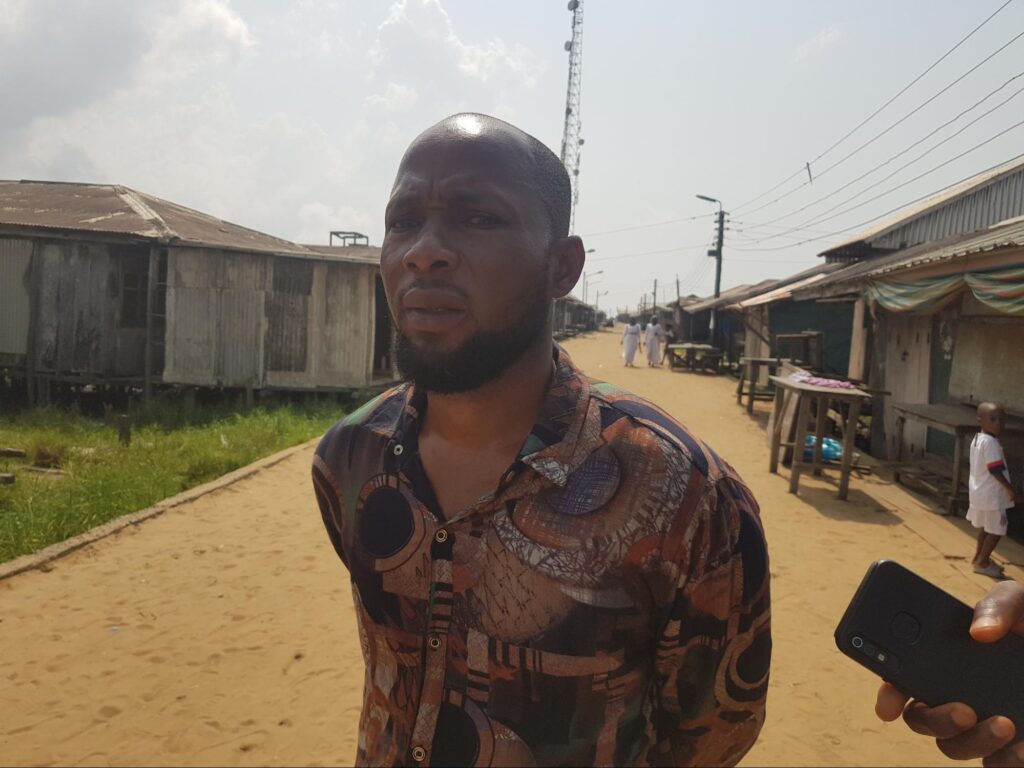
“Education is the basic need of the children but they can’t even have that. The children sometimes fall in the water when going to school. If not for teaching children how to swim in their early stages, we would have lost most of them to water,” observed Aralu.
Olayinka Stella, who teaches at Ayetoro Community School, said sea surges often keep children at home, especially when families are looking for means to survive the windstorms.
“Even teachers hardly go to school during sea surge. Also, the oil spoilage has affected many teachers as we face hardship in getting fish and other things needed for cooking. And if you did not eat, there won’t be strength to teach.”
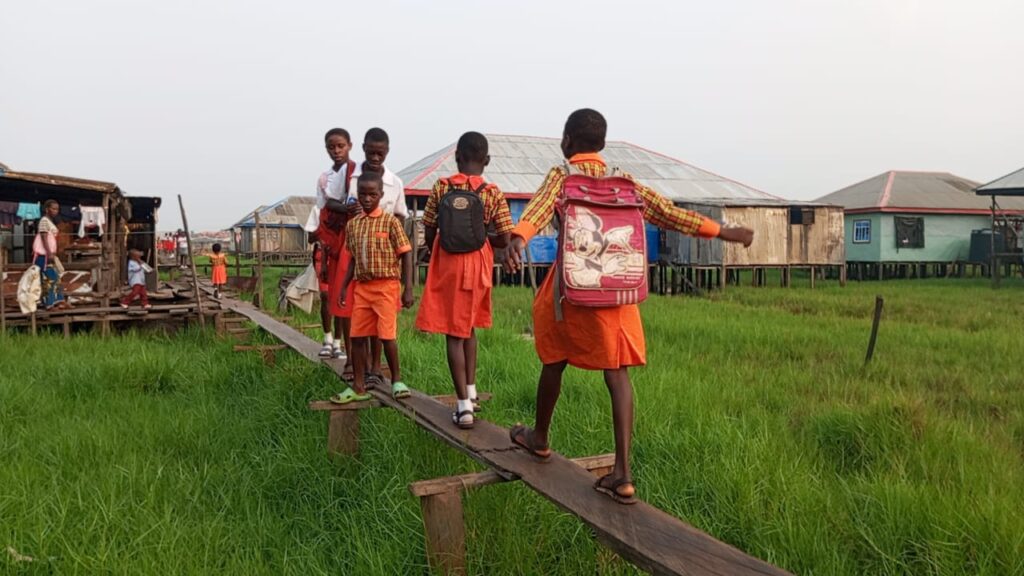
On several occasions, Ondo’s oil-rich communities are promised compensation. Residents, however, say they hardly materialise. Meanwhile, a recent ₦150 million ($326,086) paid to the community by Mobil Oil Unlimited Company as compensation for an oil spill that occurred in 1998 has generated a crisis.
While the youths in Ayetoro accused the monarch of the community, Michah Ajijo, of misappropriating the funds, he denied the allegations, saying all identified beneficiaries have been paid.
Richard Olabode, spokesperson of the governor, did not respond to enquiries from HumAngle about the situation in Ayetoro and other Ilaje communities.
“We expect that they should rescue us and give us a sense of belonging, but we don’t see such. Since democracy has started, this community and others in Ilaje have never benefited from the government,” a frustrated Aralu said.
Support Our Journalism
There are millions of ordinary people affected by conflict in Africa whose stories are missing in the mainstream media. HumAngle is determined to tell those challenging and under-reported stories, hoping that the people impacted by these conflicts will find the safety and security they deserve.
To ensure that we continue to provide public service coverage, we have a small favour to ask you. We want you to be part of our journalistic endeavour by contributing a token to us.
Your donation will further promote a robust, free, and independent media.
Donate Here





